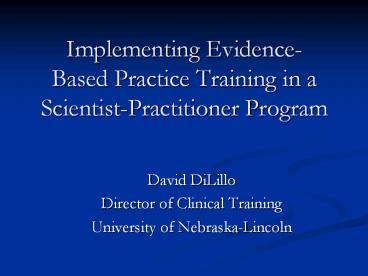Implementing Evidence-Based Practice Training in a Scientist-Practitioner Program - PowerPoint PPT Presentation
1 / 12
Title:
Implementing Evidence-Based Practice Training in a Scientist-Practitioner Program
Description:
Implementing Evidence-Based Practice Training in a Scientist-Practitioner Program David DiLillo Director of Clinical Training University of Nebraska-Lincoln – PowerPoint PPT presentation
Number of Views:102
Avg rating:3.0/5.0
Title: Implementing Evidence-Based Practice Training in a Scientist-Practitioner Program
1
Implementing Evidence-Based Practice Training in
a Scientist-Practitioner Program
- David DiLillo
- Director of Clinical Training
- University of Nebraska-Lincoln
2
Clinical Psychology at the University of
Nebraska-Lincoln
- History
- Seven core clinical faculty
- Scientist-practitioner model
- Clinical Intervention I II
3
Training Context for EBP
- Clinical psychology as a health care profession
- Focus on psychological treatments
4
The EBP Model
Best available research evidence
EBP
Patient preferences and values
Clinical expertise
5
The EBP Model
- Relevant Abilities
- Adopt a scientific view of clinical psychology
- Knowledge of clinical research design and methods
- Strategies for accessing best available research
- Ability to evaluate relevant evidence
Best Available Research Evidence
6
The EBP Model
- Relevant Abilities
- View therapy as a collaborative endeavor
- Knowledge of specific diverse groups
- Ability to ascertain
- patient values and preferences
- Respond effectively to patient preferences and
values
Patient Preferences and Values
7
The EBP Model
- Relevant Abilities
- Understand role and limits of clinical judgment
- Skills in relationship building
- Assessment and diagnostic skills
- Skills to implement ESTs (e.g., specific
therapeutic techniques) - Integration of EST with client characteristics
Clinical Expertise
8
Infusion of EBP Into Training
- Highlight existing consistenciess
- Coursework
- Review course content
- Evidence-Based Clinical Interviewing class
- Specific readings, papers, exams
9
Infusion of EBP Into Training
- Practicum training
- Clinical Intervention
- Clinic procedures
- Clinical Comps
10
Measuring Outcomes Clinical Comps
- Identify relevant empirical literature for the
case - Understand the relevant empirical literature and
is able to apply it appropriately to the case. - Identify clients values and individual
characteristics that should impact assessment and
treatment planning. - Incorporate client values and individual
characteristics into the conceptualization - Demonstrate clinical expertise appropriate to
this point in training to the case
conceptualization, assessment and treatment
planning.
11
Measuring Outcomes Clinical Comps
- Develop a case conceptualization that follows
from the empirical literature, clinical judgment
and client characteristics that can guide
assessment and treatment planning and
implementation. - Develop and implement an appropriate treatment
plan. - Demonstrate how therapy progress is monitored and
modified as needed in light of the data.
12
Challenges to Implementing EBP
- Evolving model of EBP
- Faculty know how and buy in
- Integration of outside supervisors
- Measuring long-term outcomes































